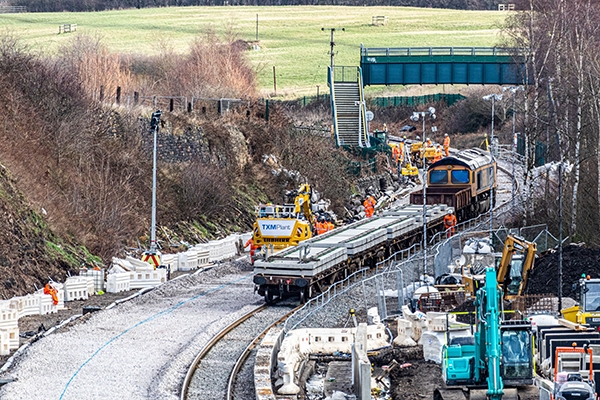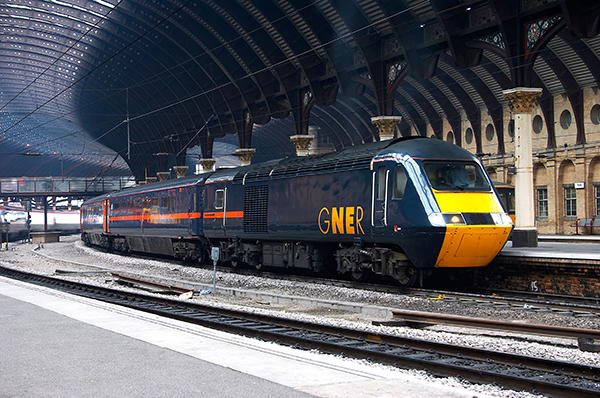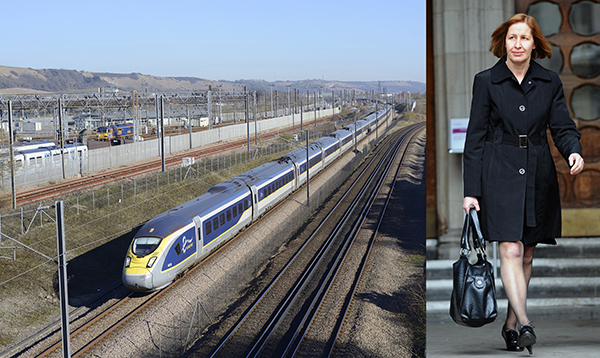Dyan Perry’s rail career began as a Station Manager at Peckham Rye, in south London. Soon, she will be stepping back from the industry as the Chief Executive Officer of High Speed 1 Ltd.
In the intervening years, Perry (nee Crowther) has served across all major facets of the rail sector - including becoming the first female managing director of a train operating company and managing director of Network Rail’s largest route. Her achievements were first recognised with an OBE in the Queen’s Jubilee honours list.
Then, in September, she received an Outstanding Personal Contribution (senior management) award at RAIL’s National Rail Awards. “For someone who was brought up on a council estate, whose dad worked in a factory, to be recognised like that is very humbling,” she reflects.
“I look around the industry at great people like Robin Gisby, Sir John Armitt, Iain Coucher, Mary Grant, and it’s just great that you’re recognised as being part of that peer group.

Perry describes being on the board of the Transpennine Route Upgrade as “a privilege to be part of something transformational, that’s also quite a challenge”. As part of that major project, Morley station is being rebuilt - as seen here in January 2023. MIKE BROOK.
In the news
“Sometimes you don’t appreciate what a privilege it’s been to work in the industry for so many years and know so much about it, because the industry has given me so much.” Perry recalls two press headlines from her career to describe the highpoints.
The first was from 2002, when she moved to York to become the successful commercial and managing director of Arriva Trains Northern, which had previously been ranked as the UK’s worst performing operator.
The headline read: ‘Dyan takes on the job that few would want.’ “It was a bit like saying ‘they couldn’t get anyone else they wanted, so they got Dyan!’ she reflects with good humour, two decades later.
“The business was on its knees, it couldn’t get any worse, so anything I did was only going to make it better. It was great to have a blank canvas. I rolled my sleeves up and it was back to basics.”
The second headline highlight was in RAIL, which branded Perry’s move to become Chief Operations Officer at Govia Thameslink Railway as: ‘The significance of Dyan Crowther.’ “Charles Horton , my boss at the time , came and put the magazine on my desk and said: ‘Do I have to pay you more now?’
“The highlight for me in that headline was that there weren’t many people like me with my skillset or my experience, because I was one of the few people who had worked in infrastructure, worked for a train operating company, worked at headquarters, and done operation and delivery. I understood the system and how everything knitted together - there are not enough people in the industry like that at the moment.

Perry was NR’s Route Director for LNE and Midlands & Continental in 2004-08, covering a patch that included the busiest sections of the East Coast Main Line. On February 5 2005, an HST led by power car 43197, in the colours of then operator GNER, is at York with a train for Glasgow. ALAMY
A force for change
Perry has given 37 uninterrupted years’ service to the railway and has been in the thick of many of those acts of defiance. This stems from the first day she started on British Rail’s graduate scheme in 1986, ahead of a “very difficult first couple of years… where you didn’t feel like you got a great deal of support”. “You felt as though some managers were not particularly welcoming of women in the industry.
Indeed, BR had just published a report at the time about equal opportunities - and one of the quotes in there was that ‘women should be pregnant and barefoot in the kitchen’. It was a time when the industry was very ‘pale-male’ and dominated by a macho culture. That’s the environment I walked into.” Of the 39 who had enrolled on the Operation Management Training Scheme, only six were women - including Perry, who asked herself: “what does being a woman bring from my perspective?” The answer: “I was going to be more memorable… with 32 blokes who pretty much look the same, and there was nobody of an ethnic background on the management training scheme.
That just became part of my toolkit. “But you had to work that little bit harder because you were expected to perform that little bit better. But then I was fortunate that I had some great supporters as well. “My first mentor on the railway was a fantastic guy called Mike Scott, who passed away just under two years ago. I kept in touch with him the whole of my railway career.
“He was just amazing. He told me as it was… a bit of a fireball. He told me what to expect, he didn’t wrap me in cotton wall, and was always a great guide who treated me the same as everybody else, which is really what I needed. He didn’t treat me any differently from the male managers in his team. I got a bollocking the same way everyone else did!”
However, it wouldn’t be until after the turn of the millennium that Perry saw the “first real cultural shift”. That was in December 2004, with her appointment as NR Route Director LNE and Midlands & Continental under Robin Gisby, “who, I think deliberately, appointed women into senior roles”.
“We also had Fiona Taylor come in to do Kent & Sussex and Jo Kaye to the West Coast Main Line. If you look at a lot of the women in the industry, the likes of Ellie Burrows and Katie Frost , a lot of those came on under Robin Gisby because he was prepared to say ‘right, get them in, let’s do something that’s a little bit different’.”
“I think if you bring women in you have good role models and you attract a lot more diversity - not just from a gender perspective. But it does make a cultural difference - and you need to have pioneers like Robin who recognise the benefit of doing that rather than just perpetuating the same-old-same-old. Andrew Haines has tried to do that.”
Even so, research carried out by Women in Rail indicates that at the current employment rate, it will take another 200 years for there to be the same number of women and men appointed to senior roles. “It’s just not fast enough,” Perry asserts. Another study, conducted in the finance service sector by the Alexander Institute, involved businesses volunteers participating in an exercise to set targets and measure how many senior women were on their boards. Not only did this lead to vastly improved gender equality, the organisations also became more profitable.
Supporting diversity
Perry continues: “Adeline Ginn, the founder of Women in Rail, says if you have ten people around the table and they’re all pale-male and from the same culture, you’ll have one idea. If you have ten people around the table from different genders, ethnicities and all sorts of diverse backgrounds, you’ll have ten ideas. That’s what you get when you have diversity round the boardroom table. “I’ve gone through quite a few conversations through my career where we’ve asked: ‘should we have gender targets?’ “I get asked quite a lot what we should be doing about diversity? How do we get a more diverse range of people into the industry. I usually give three answers:
“Firstly, you have to have policies that support diversity in the first place… acknowledgement and flexibly around people’s beliefs, such as fasting at Ramadan. There’s a lot more flexibility in recognising that in peoples’ lives within the industry, compared with what was there many years ago. Policies where people walk the talk and are applied is really important.
“Secondly, you have to have role models who people can look to and think ‘I can do that, I’m capable of doing that’, whether it be a woman, a person from an ethnic background, or someone with a disability.
“The third thing, which I have grappled with over the years, is you have to set targets. Because if it doesn’t get measured, it doesn’t get done.” Why have we not seen such action taken in our sector?
“Government doesn’t like to overregulate,” Perry continues. “They’ll give franchise obligations - for example, on apprenticeships, the number of female train drivers. But it’s teeny-teeny-tiny. It needs to go through the whole of organisations.
“If you look at the skills gap that’s hurtling towards us, part of my role with NSAR is to promote that the future has skills gaps. The challenges go hand-in-hand with having to have a more diverse culture because you need the youngsters of today who are going to say ‘yeah, I’m going to choose rail’.
You need to get the industry starting to grow its own talent. Otherwise, the future skillsets just aren’t going to be there.” Perry argues that diversity, in its broadest meaning, “brings a different dimension, helps drive productivity, helps close the skills gap, and opens up the industry to a lot more people”.
Renewing the value of rail
The sector “needs to find its voice again… to build advocacy and show its value.” Because what the retiring CEO of HS1 currently sees is “a reluctance from government to promote rail in the same way that you see it being promoted in European counties”.
She continues: “Post-COVID, Spain, Portugal and Italy all introduced the ability to travel all over the network for free. Wow. ‘Come back and use our railways.’ “What you now see in Europe is that commuter traffic has come back strongly, so it is disappointing that we are not fast-tracking rail reform. While the creation of Great British Railways got a nod in the King’s Speech, it’s still going to be four to five years before anything material happens.”
“What we need now is for people to accept that nothing big is going to happen in five years, so what are our three to five-year plans? How can we fast-track the digital agenda? Where are the sandpits going to be?”
This is where Perry returns to her point about rail selling itself: “It isn’t like money isn’t being spent. Look at East West Rail and the rest of HS2 to be completed. You have these pockets of great stuff happening, but it just doesn’t get recognised.
Tightening government purse strings was very much at the heart of the Prime Minister’s axing of the northern leg of HS2, which to Perry “just seems counter-intuitive”.
Read more of Dyan Perry's thoughts from her tenure as HS1's CEO in Rail 1001, on-sale January 24.


















Login to comment
Comments
No comments have been made yet.